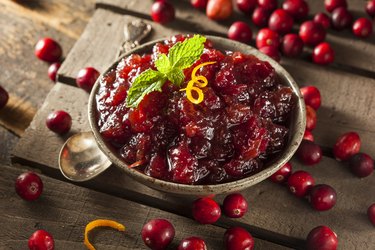
Whether you skip over it or pile it on your plate, cranberry sauce is a staple on holiday tables. This classic sweet and tangy spread goes well with turkey and other savory meat dishes, and also adds some valuable nutrients to your meal.
Cranberry sauce is available canned and often sweetened with added sugars. While eating a small amount of sweetened cranberry sauce is OK, making your own from fresh berries allows for more control over what ingredients you use to prepare it, which could make it a more nutritious choice with less sugar.
Video of the Day
Video of the Day
Cranberry Sauce Nutrition Facts
A 1/4 cup of cranberry sauce is equal to one serving and contains:
- Calories: 110
- Total fat: 0.1 g
- Saturated fat: 0 g
- Cholesterol: 0 mg
- Sodium: 3.5 mg
- Total carbs: 28 g
- Dietary fiber: 0.8 g
- Sugar: 22 g
- Protein: 0.6 g
Cranberry Sauce Macros
- Total fat: A 1/4 cup of cranberry sauce has 0.1 grams of total fat, which includes 0.021 grams of polyunsaturated fat, 0.005 grams of monounsaturated fat, 0 grams of saturated fat and 0 grams of trans fat.
- Carbohydrates: A 1/4 cup of cranberry sauce has 28 grams of carbs, which includes 0.8 grams of fiber and 22 grams of sugar.
- Protein: A 1/4 cup of cranberry sauce has 0.6 grams of protein.
Vitamins, Minerals and Other Micronutrients
- Vitamin E: 4% of your Daily Value (DV)
- Iron: 2% DV
- Copper: 2% DV
- Manganese: 2% DV
- Selenium: 1% DV
- Vitamin C: 1% DV
- Thiamin: 1% DV
- Riboflavin: 1% DV
- Vitamin B6: 1% DV
- Vitamin A: 1% DV
- Vitamin K: 1% DV
The Health Benefits of Cranberry Sauce
1. It Can Support Heart Health
There are several nutrients in cranberry sauce that may benefit your heart, including fiber, vitamin E and antioxidants.
A 1/4 cup of cranberry sauce has 0.8 grams of fiber. Eating more fiber can promote healthy cholesterol levels, which reduces the risk of heart disease. Researchers reviewed studies including 4,635 participants and observed that those who ate between 25 and 29 grams of fiber daily had a 15 to 30 percent decrease in all-cause and heart-related deaths compared to those who ate the least fiber, per a February 2019 review in The Lancet.
A 1/4 cup of cranberry sauce has 4 percent of the daily value for vitamin E, a fat-soluble vitamin that has antioxidant properties in the body. Researchers found that vitamin E supplements are linked to reduced systolic blood pressure (the top number in a blood pressure reading) in those with high blood pressure, per a March 2019 review in the Journal of Human Hypertension.
Cranberries are high in inflammation-fighting plant compounds known as polyphenols, particularly anthocyanins. Research has found a connection between drinking cranberry juice and lower blood triglycerides, a heart disease risk factor, per an April 2020 article in the British Journal of Nutrition.
2. It's Low in Unhealthy Fats
While commercial cranberry sauce is relatively high in calories with 110 calories per 1/4-cup serving, it is low in fat, with only 0.5 grams per 1/4 cup.
You can use cranberry sauce when making marinades or dressings as a way to reduce the amount of oil you use. Cranberry sauce doesn't contain saturated or trans fat, both of which are associated with an increased risk of heart disease, including high cholesterol levels, and other health problems, according to the National Library of Medicine.
3. It's Loaded With Antioxidants
Cranberries are a good source of antioxidants, plant compounds that protect you from free radical damage that occurs with exposure to environmental toxins. Cranberries are one of the highest food sources of the anthocyanin peonidin, per a November 2013 article in Advances in Nutrition.
Several studies have found that peonidin has potential anti-cancer properties when studied against colon, oral and cervical cancer, per a May 2020 article in Antioxidants.
One Downside: Cranberry Sauce Is High in Sugar
While there are potential benefits to eating cranberry sauce at your Thanksgiving dinner, the popular topping is high in sugar.
Just 1/4 cup serving of canned cranberry sauce has 22 grams of sugar, many of which are added sugars in the form of high-fructose corn syrup.
Added sugar from high-fructose corn syrup can cause the same health problems that added sugar from sucrose can. In a study comparing the health effects of drinking sucrose-containing drinks and drinks sweetened with high-fructose corn syrup, researchers found that both had similar negative effects on the liver, insulin sensitivity and blood cholesterol, per July 2021 research in The Journal of Clinical Endocrinology & Metabolism.
The American Heart Association recommends limiting added sugars to less than 36 grams per day for people assigned male at birth and 25 grams per day for people assigned female at birth.
Tip
Try this Sweet-Tart Cranberry Sauce recipe that only has 13 grams of sugar per 1/4 cup and is full of whole-food ingredients.
- USDA: "Cranberry Sauce"
- CDC: "Heart Disease Facts"
- The Lancet: "Carbohydrate quality and human health: a series of systematic reviews and meta-analyses"
- Journal of Human Hypertension: "Effect of vitamin E supplementation on blood pressure: a systematic review and meta-analysis"
- British Journal of Nutrition: "Effect of daily consumption of cranberry beverage on insulin sensitivity and modification of cardiovascular risk factors in adults with obesity: a pilot, randomised, placebo-controlled study"
- NIH: "Facts about Saturated Fat"
- Advances in Nutrition: "Cranberries and Their Bioactive Constituents in Human Health"
- Antioxidants: "State of the Art of Anthocyanins: Antioxidant Activity, Sources, Bioavailability, and Therapeutic Effect in Human Health"
- The Journal of Clinical Endocrinology & Metabolism:"Consuming Sucrose- or HFCS-sweetened Beverages Increases Hepatic Lipid and Decreases Insulin Sensitivity in Adults"
- American Heart Association: "Added Sugars"